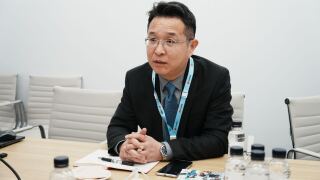In any industry, keeping a flow-through of relevant leadership talent is vital. If vision and momentum aren’t maintained and driven from the top of the company, even the most successful business can go off course.
In the telecoms industry, the accelerating pace of disruption has placed renewed emphasis on the make-up of the top team.
CEOs have a duty to keep their knowledge current, and to keep themselves surrounded by the right combination of experience and skills – taking a proactive role in ensuring the company adapts its approach to recruiting and developing next generations of leaders.
At Orange International Carriers, CEO Pierre-Louis de Guillebon takes this responsibility seriously.
His own background is in engineering, mostly in telecoms: the majority of his career has been in various roles within France Telecom/Orange.
He has been in his current position for about a year. Across his career he has witnessed great change.
Twenty years ago he led a team of 50, overseeing the rollout of France Telecom’s long-distance fibre network. Today his remit is much more strategic, keeping a close eye on how the market and customer needs are changing, to ensure Orange doesn’t miss a trick. Innovation, virtualisation and the cloud, content delivery and security are all major preoccupations, along with specific opportunities related to 5G, the internet of things, VoIP and voice over LTE. Blockchain is a recent interest, as part of Orange’s plans for mobile payments.
“Fortunately, I am a kind of geek,” he says. “I love new technology, and seeing if there is an opportunity for my business – trying to forecast the innovations that will be the most successful, and which we can adapt for our customers.”
To stay in tune with the market, de Guillebon spends a lot of time talking to Orange International Carriers’ large enterprise customers. Before taking up his current position, he was responsible for growing Orange’s activities in the business-to-business market in the Paris area, and headed the technical project for the Euro 2016 football tournament. Spending time with clients as diverse as UEFA and Hermès has kept him grounded, he says.
Challenge
“The best way to challenge yourself as a leader is to deal with customers,” he says. It’s also a good way to observe and learn from what digital transformation means in other industries, he notes. “You can’t stay in your own world,” he notes. “That’s true geographically too – what’s happening in China, Japan, the Middle East and beyond can vary a lot, so it helps to have the rounded picture.”
When it comes to recruiting leadership talent, the unit faces an unusual restriction. Orange as a group has a policy of recruiting for top positions only from within the company. “We’re very limited in our ability to seek senior people from outside Orange and therefore the [wider] telecoms industry,” de Guillebon says.
Although there’s nothing to say that position couldn’t be reviewed in future, for now it means de Guillebon and his team have to be creative about building a progressive team which reflects a fast-changing market.
His new head of marketing, he notes, has joined from Orange’s retail operations in France, and other senior roles have been filled from different corners of the business – internationally too – to maximise diversity of experience and skills.
Start-up programme
Strategic partnerships present opport-unities as well. Orange complements its own 6,000+ strong team of researchers and innovation engineers with an aggressive start-up programme through which it incubates and draws on external talent, energy and ideas. “In return, we help those start-ups develop. It’s a win-win,” de Guillebon says. “Sometimes we take shares in those businesses.”
At Telia Carrier, Staffan Göjeryd has also been in position as CEO for about a year. But unlike de Guillebon, his background is in business administration, organisational theory and strategy, and finance/economics. He graduated with a bachelor’s degree in business administration.
Göjeryd has held a lot of technical roles though. “In the early days, all you needed was an interest in the technical side,” he notes. He remembers being part of the team building out Telia’s internet capability when the web was still in its infancy, and has been director of network planning and head of Telia Carrier’s data and infrastructure business over the years.
Like de Guillebon, Göjeryd has found what customers do with it is more interesting than connectivity for its own sake.
Customer centricity
As the market has succumbed to changing customer behaviour and the new potential enabled by the latest technology, the emphasis of Telia Carrier’s business and its leadership have changed. “At one stage, in the early 2000s, there was a lot of build-out so the emphasis was on project management, and organisational and financial control,” Göjeryd notes.
“But now we’re becoming more of a service organisation and the emphasis is on customer centricity and service enablement.”
Göjeryd can’t comment on what plans there might be for his own succession: “That’s somewhat out of my hands,” he notes. But he has no doubt that the ideal qualities for a telco leader today and tomorrow differ significantly from 10-15 years ago.
“Back then telecoms was telecoms, and everything else was something different,” he says. “That’s no longer the case: everything is intermingling.”
This translates into the need for a broader pool of talent and experience. When recruiting, Telia Carrier looks to fill gaps rather than appoint more from the same mould.
“Each person must add value, and specifically in relation to your current challenges as an organisation. People in the wholesale telco industry know telecoms very well; what they understand less well is customer centricity, data abstraction, better use of data and so on.”
While incoming team leaders will need a basic interest in connectivity and how content and data are distributed, they could be coming at this from a different angle, Göjeryd notes.
Software industry
Telia Carrier has brought in people from more of a consultancy background, for instance, and those with a strong pedigree in customer service – from the software industry and beyond.
In common with so many companies, Telia Carrier is on a major digital transformation journey.
So software skills and experience are particularly desirable, to take the company towards a future that will depend increasingly on the cloud and network virtualisation – as long as this expertise can be applied to address the specific needs of the business and its customers.
“There’s no doubt we are, and need to be, more data driven. How we exchange information, ensure it is accurate, and make this more transparent and share it more readily – internally and externally – are issues for everyone at the moment, not just carriers or even telcos,” Göjeryd notes.
And this evolution has to happen at the core of the company, not out at the periphery. “I wouldn’t want a separate chief digital officer at Telia Carrier,” he says. “The digital journey needs to be integral, and understood by everyone – not a side function.”
Göjeryd believes internal people can be retrained in line with market changes, but that existing teams may not be able to take the business to new places. “They may not be the catalyst for the changes that are needed. Sometimes you have to bring in the different philosophy. You can – and should – teach existing people the benefits of a different approach though. It needs a balance.”
Stay curiousIn terms of his own personal development, Göjeryd feels it’s important to “stay curious” – about what Telia Carrier’s customers’ customers are doing, and what’s happening in other industries. “I try to spend time on this; whether it’s enough, I don’t know,” he says.
He looks for this quality in others too. “We need people who are curious about what’s happening out there, what our angle is and how we need to evolve to deliver that. We also need passion. As long as it’s directed and relevant, that’s almost more important than anything else.”




